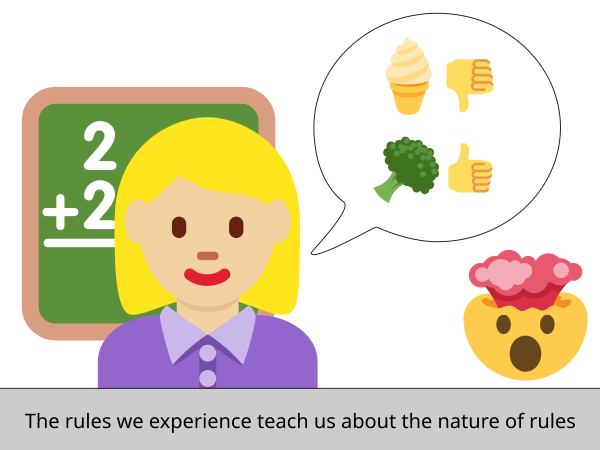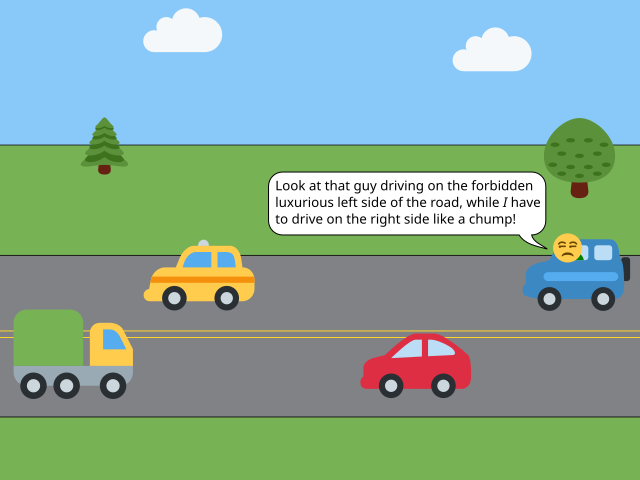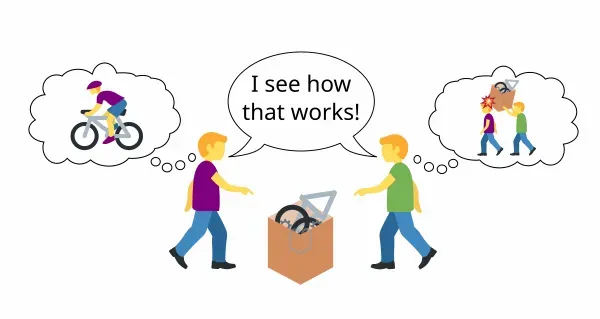Rules and Systems Have Bad PR
0 comments
(cross-posted from my Substack)
Rules and Systems Have Bad PR
People have negative associations with rules and systems, which has consequences for systems composed of rules
The common way our brains learn about categories of things involves being exposed to multiple examples and pattern-matching on the common factors. When we’re children we learn about the color “red” by people pointing at various different things that are red (apples, firetrucks, etc.) and saying “that’s red” and eventually we catch on. Of course this happens even when people aren’t explicitly trying to teach us, we’re doing this all the time as we learn about the world. Another thing we teach children is what “the rules” are, and these rules often feel very negative when we’re subjected to them. When the rules as-experienced are things like “you’re not allowed to eat ice cream right now” or “you have to eat vegetables right now” they seem arbitrarily cruel: “You’re not allowed to eat food that tastes good, you have to eat food that tastes bad!”. Not only that, often the rules seem like they’re to your detriment and the benefit of others: “You have to go to bed, we can stay up late.”

Part of the reason for this is selection bias: the rules that tend to come up the most involve situations where our natural inclinations (like “sugar tastes good” or “I want to keep having fun”) are in conflict with a system that’s intended to have less-proximate benefits (an all-sugar diet is unhealthy, a regular sleep schedule is beneficial). Part of it is because people with power sometimes do impose ad hoc rules for their own benefit, like a parent forbidding a certain toy because it’s too noisy for their liking. Also, “the rules” are often a convenient scapegoat to attach negativity to: I’m nice, I’d like to let you eat all the ice cream you want, but the rules won’t let you (except when I’m being very nice and make an exception). Being exposed to examples like this tend to let us notice a pattern and attach negative associations to the category: rules are arbitrary, mean things that are imposed on you.
But not all rules are like that. Rules are the things we build social systems out of, and often following them just makes things better for everybody. For example, when everybody drives on the right side of the road it lets roads work better – it is an arbitrary constraint (indeed, several countries do it the opposite way) but it’s a constraint we don’t tend to mind because it makes sense and it works for us.

So rules can be neutral or even good, especially when they’re part of a good system. Unfortunately, not all systems are like that. Sometimes systems do tend to benefit some at the expense of others. For example, some systems of “unwritten rules of social propriety” that involve rules like “don’t wear white after Labor Day” seem to primarily exist for justifying scorn at the uninitiated and having a way for those who are especially high-status to show that they’re “above the rules”. And when systems are nonfunctional or only partially functional that can provide a point of leverage for people with the power to make exceptions or otherwise let you bypass the system: the system is mean, but I’m nice and I can do special favors for you. When systems seem to benefit some at the expense of others there’s always a question of whether it’s a bug or a feature (and in some ways critical outsiders can end up in a de facto alliance with cynical insiders in coming down on the “feature” side of that question).

Regardless of whether the dysfunction of certain systems is intentional, we tend to encounter many social systems that don’t seem to work well. I think the Lake Woebegon Effect tends to make people think they’ll be especially likely to receive the benefit of preferential treatment, so a cold “system” can feel like an obstacle that often requires the “personal touch” of someone to get around. And the complexity of a system can often seem like a faux complexity that masks the simple injustice of it.[1] And as we encounter systems like this we build associations, and the cynical view that The System™ is fundamentally corrupt tends to resonate, while the prospect of functioning systems is the province of either naive dreamers or cruel authoritarians.
What’s the upshot?
I think these negative associations contribute to the shape of discourse and public understanding. Regardless of whether people ought to feel this way, many do. With regard to TTRPGs, I think this accounts for why “rules light” is often an attractive selling point even if games are things that are literally made of rules[2]. I think it’s a factor in why the discourse around things like “System Matters”, dice fudging, and “rules vs. rulings” is so fraught. In politics, I think it’s why people on all sides tend to start from a standpoint of suspicion regarding the plans of “the other side”. I think it’s also why people who are deft at social manipulation can make sticking to an already-agreed-upon system feel like a special favor to you rather than the baseline, so you end up feeling indebted for doing the normal thing.
For people like me who care about rules and systems, how they work, and how to make new things out of them or improve the ones we have, I think we need to figure out how to adapt to this feature of the discourse terrain rather than getting continually stuck in the same swamps. It suggests to me that it’s a good idea to avoid making arguments that can be “up-levelled” to be about the category (for example, a statement that’s contrasting two different rules is harder to interpret as a statement about all rules). I think it means that things that are naturally contextualized or localized are less likely to trigger reactance and backlash: incremental changes or experiments that are confined in time or space are likely preferable framings to revolutionary changes or massive overhauls. I think it means it’s better to start by building systems and structures that function well and then inviting people to opt into them than it is to put the focus on power or authority. There are probably other implications as well.
[1] I think there’s some relationship between complexity and morality that’s worth exploring that I haven’t fully thought through yet. We’re often reluctant to try to explore the motivations and perspectives of bad actors (heinous criminals, evil dictators, etc.), perhaps out of concern that the negative moral judgment they deserve will be undermined if there are “excuses” for their bad behavior floating around. Maybe related to Attribution Error?
[2] TTRPGs that are light on explicit rules aren’t necessarily simple, often their complexity is hidden in habits and practices that the players bring to them. But the lack of explicit complexity often makes them look like good systems for beginners or children when that might actually be the opposite of the case. Also, since freeforming is something that people can already do, trying to win the “rules light” race seems to me as fruitless as trying to make a beverage that’s lower-calorie than water.
Comments